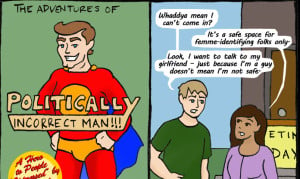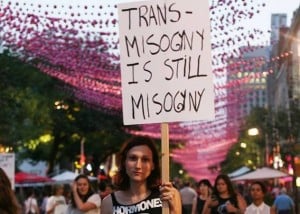
One person with their arms wrapped around the other, while they take a selfie together on a city street.
I’m standing outside of a club with some of my best friends.
We’re standing in a circle, laughing and chatting and enjoying ourselves. Intermittently, we touch each other’s hair, we put an arm around the other, we kiss each other on the cheek, and we yell above the noise, “I love you so, so much.”
Gender stereotypes and norms would tell you that we are a group of women.
But we aren’t. We’re a group of queer-as-hell men with a total disregard of gender norms.
When I made the decision to transition – changing my gender presentation and pursuing hormones – I knew that testosterone in particular would come with a host of expectations around performing masculinity. And as a genderqueer trans man, I didn’t know exactly how comfortable I was with that – especially since so many aspects of masculinity can be toxic.
While I would benefit from gaining numerous privileges associated with masculinity, I would also have to contend with the gender norms that harm so many men and masculine-identified people.
But when I fell into a community of queer men – some transgender, some gender non-conforming, all identifying as “men” to varying degrees – I found a very different kind of masculinity. While they are by no means representative of all queer men, what I learned from them was transformative.
This community taught me not only what toxic masculinity demands of men, but also the possibilities that exist outside of it.
In the process, I came to realize the kind of masculinity that I could be comfortable inhabiting.
Here are a few of the things that I’ve learned from them.
1. Masculinity Doesn’t Mean Denying Each Other Physical Affection
Men aren’t often seen hugging each other in this society. If they touch each other, even in a platonic way, it’s considered too “gay” or effeminate. As a result, we have men who seldom share physical affection, affirmation, or closeness.
While everyone’s personal boundaries are different, masculine-identified folks are never given the freedom to set their own boundaries. There’s one boundary and one boundary only, and it’s that men shouldn’t share physical closeness. This isn’t just limiting. This can be painful.
What I appreciate so much about the community of queer men that I’ve fallen into is that we love on each other.
In my community of queers, we greet each other with warm embraces. We lean on each other and hold each other through difficult moments. We aren’t afraid to touch each other and express our affection for each other just because society says that men and masculine-identified folks shouldn’t do so.
Just imagine what friendships between masculine-identified people could look like if we felt encouraged to express our affection for each other in whatever ways felt comfortable for everyone involved.
Imagine the closeness, the reassurance, the comfort, the support, the vulnerability – these are very healthy experiences that are encouraged in female friendships, but never permitted for men and masculine-identified people.
Denying men and masculine-identified people a full spectrum of intimacy with their friends is one of many ways toxic masculinity hurts us. And rediscovering this intimacy with my male friends has been profound.
For me, having this kind of consensual physical closeness between men has been healing. So much of toxic masculinity relies on the idea that men and masculine people must keep others at a distance.
But why should we?
From a simple mental health perspective, I know that this kind of shared affection between friends can help us feel connected to each other and creates a sense of safety within our community.
2. Masculinity Can And Should Involve Emotional Vulnerability
Men shouldn’t cry. Men shouldn’t be emotional. Men should deal with their shit on their own time.
When I began my transition, I was fearful that I would feel pressured not to express myself or my feelings. And in the beginning, this was absolutely true.
If you browse through my Instagram, for example, you’ll see that prior to testosterone, I took many selfies while smiling – but when I started testosterone, I took pictures with more serious and standoffish faces, thinking that they made me “look more masculine.”
I didn’t even notice at first.
This insidious idea that men shouldn’t have emotions had impacted even the ways in which I took photographs of myself. I had internalized this idea that masculinity was about distance and suppressing my emotions – even joyful ones.
Encouraging men to not be emotionally vulnerable is enormously harmful.
Expecting us to push down our feelings can eat us alive, deny us valuable resources and support that we need, and often puts the emotional labor onto other gender minorities who are put into caretaking roles.
I would even venture to say that the epidemic of violence coming from primarily white men in the United States can be connected to the suppression, hostility, and aggression that is expected of them as the only legitimate avenues to asserting their masculinity.
Finding a community of men that are very expressive, share their feelings and their struggles, and support one another through them has been so important in pushing back against toxic masculinity that encourages us to isolate ourselves and lash out.
I feel empowered to be among queer men who aren’t afraid to show vulnerability and encourage one another to reach out during difficult times.
Their sensitivity, warmth, and compassion fly in the face of everything that hegemonic masculinity has told us to be.
3. Masculinity Isn’t About Rejecting What’s Deemed ‘Feminine’
The first people to comment on my sparkly, beautiful nails were the queer men in my life. Some of them applauded how rad they looked. Some of them remarked on how they, too, needed to get theirs done.
And none of them shamed me or questioned the choice.
I once wrote an entire article about how I was fearful that being on testosterone would take away some of my favorite, more “femme” parts of who I am – and how I was determined to hold onto these things.
Toxic masculinity greatly limits the emotional range that men and masculine people can have, and it also limits our gender expression as well. At the root of this is misogyny, which privileges what we associate with masculinity over what we associate with femininity.
Often times, men and masculine people can fall into the trap of rejecting what is considered “feminine” because they feel it will affirm or legitimize their masculinity in the eyes of other people.
But well into my transition now, I am still rocking the nails, blathering on about my passion for interior design and stylish clothes, singing pop music at the top of my lungs, and crying over romantic comedies.
I don’t reject any stereotypically “feminine” aspect of myself just to cater to patriarchy. I am flipping the bird to a gender binary that says masculinity and femininity are these dual, opposing forces that, upon ever mingling, the universe will implode.
Thankfully, the universe has yet to implode from my queer, femme masculinity.
In reality, they don’t need to be in opposition, nor should one be valued over the other. In fact, femininity, masculinity, and even androgyny can be ingredients to each of our own individual, unique recipes that make up who we are and what we feel empowered by.
Or, you know… we can just ditch the binary thinking altogether and let people live.
I wouldn’t have felt like I could really be myself until I saw other queer men embodying this – a gender fluidity in which the limiting norms and rules of masculinity no longer apply – and embracing their whole selves, femininity unapologetically included.
They have rejected this binary way of thinking, refusing the “either/or” ultimatum of the gender binary (some of them, like me, even identifying as non-binary).
Seeing other men who are unafraid to fuck with gender has made me feel empowered to do the same.
4. Pushing Back Against Toxic Masculinity Means Acknowledging Our Privileges
Often times, women and other gender minorities take on the emotional burden and labor of educating men, in particular, about privilege.
It’s an unfair burden, to be sure, as folks who are on the receiving end of oppression should never be obligated to educate their oppressors, nor should privileged people feel entitled to their labor and energies.
What I’ve found so promising about the community that I’m surrounded by is that the men in my life have taken the initiative not only to have these conversations among themselves, but to act as interrupters and to educate other men and masculine people about their privilege.
One of the most eye-opening parts of transition has been seeing the ways in which I am treated differently as I move through public spaces. And in community with other queer and trans men, this has opened up many conversations about power, privilege, and interruption.
An essential part of dismantling toxic masculinity is men taking ownership over their own education around systemic inequality, and taking on the labor of educating other men about it as well.
It’s also about interrupting the manifestations of patriarchy when we see it. It’s about ensuring that marginalized folks feel safe in our spaces. It’s about being cognizant of the space that we, ourselves, take up. It’s about utilizing our power to amplify the voices of marginalized folks within our community.
It’s about tuning in when marginalized folks take the time to call us in, apologizing when we’ve fucked up, and taking ownership over our position of privilege.
And it’s definitely – definitely – about holding one another to a higher standard, calling in other men and being willing to be called in when mistakes are made. This is especially critical so that this labor is not left to people of marginalized gender who must endure microaggressions and harm to call us in.
When I identified as a cis woman long, long ago, I can remember feeling extraordinarily unsafe in groups of men, to the point where I wouldn’t be in those spaces at all.
Identifying now as a genderqueer trans guy who has masculine privilege, I want to create the kinds of spaces where gender minorities can choose to be in community with us, knowing that the burden doesn’t rest on them to maintain the safety of our space.
I’m grateful that I exist in community with other men who feel the same way.
***
When I first embarked on my gender transition, I was scared of masculinity. I was scared of all that it had come to represent. I was scared of all of the toxic expectations that would fall on my shoulders.
Unpacking those expectations and doing better as a person of privilege will be an ongoing process for the rest of my life. But I’m grateful to say that in community with other queer and trans men, I’ve found a space to do this processing in a healthy way.
Surrounded by queer men who push back against hegemonic masculinity, I’ve also been able to carve out a new kind of masculinity for myself – one that I feel is both healing and empowering, allowing me to be my authentic and most honest self.
Communities like these, however small they may be, give me hope that a new kind of masculinity is possible – one that is nurturing, sensitive, vulnerable, self-aware, and even radical.
Knowing that it’s possible, I am committed to resisting this paradigm until it finally collapses under the weight of itself.
Because when masculinity is toxic – when it actively harms not only those who are marginalized but the oppressors themselves – it can never be sustainable.
[do_widget id=’text-101′]
Sam Dylan Finch is a Staff Writer and Editorial Coordinator for Everyday Feminism. He is a transgender writer, activist, and educator based in the San Francisco Bay Area, exploring the intersections of mental illness and queerness. In addition to his work at Everyday Feminism, he is also the founder of Let’s Queer Things Up!, his beautifully queer blog. You can learn more about him here and read his articles here. Follow him on Twitter @samdylanfinch.
Search our 3000+ articles!
Read our articles about:
Our online racial justice training
Used by hundreds of universities, non-profits, and businesses.
Click to learn more
Most Read Articles
- « Previous
- 1
- …
- 30
- 31
- 32



















